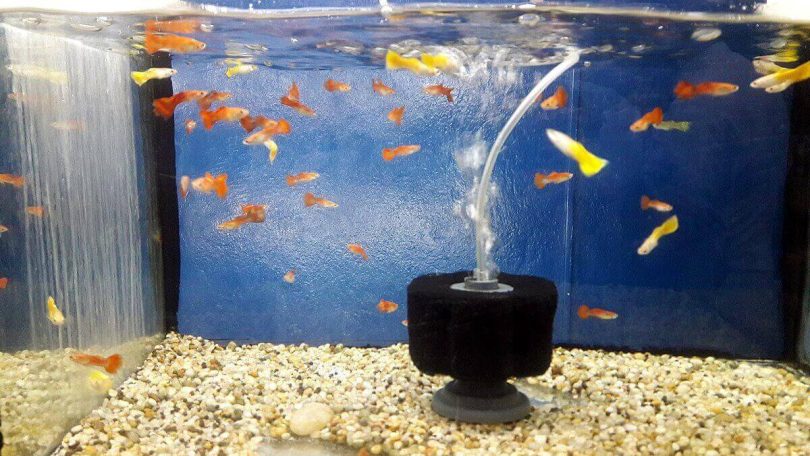Table of Contents
If you are a betta fish owner, you might be wondering if an aquarium filter can harm your betta fish. Betta fish are known for their beauty and unique personalities, but they are also sensitive creatures that require a specific environment to thrive. The use of an aquarium filter is a common practice among fish keepers, but is it safe for betta fish?
The short answer is yes, an aquarium filter can harm your betta fish if not used properly. While filters are designed to keep the water clean and clear, they can also create a strong current that can stress out and exhaust betta fish. Additionally, some filters may be too powerful for the small tanks that betta fish are often kept in, which can lead to injury or death. It is important to choose the right type of filter and adjust its settings to ensure the well-being of your betta fish.
However, it is also important to note that a properly functioning filter is essential for maintaining a healthy environment for your betta fish. Without a filter, harmful toxins and bacteria can build up in the water, leading to illness and even death. Therefore, it is crucial to find a balance between the benefits of using an aquarium filter and the potential risks it may pose to your betta fish.
Understanding Betta Fish and Their Environment
Betta fish are tropical fish that are native to rice paddies and slow-moving streams in Southeast Asia. These fish are known for their vibrant colors, long fins, and aggressive behavior towards other fish. In their natural habitat, betta fish live in warm, shallow waters with plenty of plants and hiding places.
When it comes to keeping betta fish as pets, it’s important to recreate their natural environment as closely as possible. This means providing them with a tank that is at least 5 gallons in size, with a heater to maintain a temperature between 76-82°F and a filter to keep the water clean.
However, not all aquarium filters are suitable for betta fish. Some filters, such as those with high flow rates or strong currents, can be harmful to betta fish because they can cause stress and damage to their delicate fins.
It’s important to choose a filter that is appropriate for the size of your tank and the needs of your betta fish. A filter that is too small or weak may not be able to keep the water clean, while a filter that is too strong can create a current that is too strong for your betta fish to swim in comfortably.
In addition to a filter, it’s important to provide your betta fish with plenty of plants and hiding places in their tank. This will help to recreate their natural environment and provide them with a sense of security.
The Role of Aquarium Filters
Aquarium filters play a crucial role in maintaining a healthy environment for your betta fish. They help remove harmful toxins and waste products from the water, ensuring that your fish can breathe and swim comfortably.
There are different types of filtration processes that aquarium filters use to keep the water clean. Mechanical filtration involves physically trapping debris and waste particles in the filter media. Biological filtration uses beneficial bacteria to break down harmful toxins into less harmful compounds. Most aquarium filters use a combination of both mechanical and biological filtration.
There are several types of aquarium filters available in the market, including power filters, internal filters, hang-on-back filters, and canister filters. Each type of filter has its own advantages and disadvantages, so it’s important to choose the right one for your aquarium setup.
When selecting a filter for your betta fish, it’s important to consider the size of your aquarium, the type of fish you have, and the filter’s flow rate. Betta fish prefer slow-moving water, so it’s recommended to use a filter with a low flow rate. You can also use a filter with adjustable flow settings to customize the water flow according to your betta’s needs.
The Importance of Water Quality
As a betta fish owner, you must understand the importance of maintaining high water quality in your aquarium. Water quality directly affects the health and well-being of your betta fish. Poor water quality can lead to stress, illness, and even death.
Water quality is determined by several factors, including pH, ammonia, nitrite, nitrate, and other toxins and impurities. It’s important to regularly test your water parameters and make any necessary adjustments to maintain a healthy environment for your betta fish.
One of the most critical factors in water quality is the pH level. Betta fish prefer a pH range of 6.5 to 7.5. Any significant deviation from this range can cause stress and harm to your fish. Additionally, high levels of ammonia and nitrite can be toxic to betta fish, leading to illness or death.
It’s essential to keep your aquarium clean and free of debris to prevent the buildup of toxins and impurities. Regular water changes and proper filtration are crucial for maintaining water quality. The ideal water temperature for betta fish is between 76°F and 82°F, so it’s important to monitor and adjust your aquarium’s temperature as necessary.
Nitrogen Cycle and Beneficial Bacteria
When it comes to keeping a betta fish healthy, it’s important to understand the nitrogen cycle and the role that beneficial bacteria play in maintaining a healthy aquarium environment.
The nitrogen cycle is the process by which waste products in the aquarium, such as uneaten food and fish waste, are broken down into less harmful compounds. This process involves the conversion of ammonia into nitrite, and then nitrite into nitrate. Ammonia and nitrite are both toxic to fish, but nitrate is relatively harmless in small amounts.
Beneficial bacteria are essential to the nitrogen cycle. These bacteria consume ammonia and nitrite and convert them into nitrate, which can then be removed from the aquarium through water changes or by plants. Without these bacteria, ammonia and nitrite levels can quickly rise to dangerous levels, putting your betta fish at risk.
While aquarium filters can help to remove waste products from the water, they do not necessarily provide the necessary bacteria for the nitrogen cycle. Some filters may actually remove too much of the beneficial bacteria, which can disrupt the nitrogen cycle and harm your betta fish.
To ensure that your betta fish has a healthy and stable environment, it’s important to establish a colony of beneficial bacteria in your aquarium. This can be done by adding a bacterial supplement, such as a starter culture or a liquid bacteria product, to your aquarium. You can also promote the growth of beneficial bacteria by adding a substrate, such as gravel or sand, to your aquarium.
By understanding the nitrogen cycle and the role of beneficial bacteria, you can help to create a healthy and stable environment for your betta fish.
Potential Risks of Filters for Betta Fish
When it comes to keeping your betta fish healthy and happy, a filter can be a great addition to their aquarium. However, it’s important to be aware of the potential risks that come with using a filter.
One of the main risks of using a filter for your betta fish is stress. Betta fish are sensitive to changes in their environment, and the addition of a filter can cause them to become stressed and agitated. This can lead to a number of health issues, including a weakened immune system and an increased risk of illness.
Another potential risk of using a filter is injuries. If the filter is too strong, your betta fish may be sucked up against the intake and injured. Additionally, if the filter is not properly installed or maintained, it can become a hazard for your fish.
In some cases, filters can even lead to death. If the filter is too strong or the water flow is not properly regulated, your betta fish may become exhausted and unable to swim. This can lead to drowning or other serious health issues.
It’s important to be aware of these potential dangers when using a filter for your betta fish. Make sure to choose a filter that is appropriate for the size of your tank and the needs of your fish, and always monitor your fish closely for signs of stress, illness, or injury. With proper care and attention, a filter can be a valuable tool for keeping your betta fish healthy and happy.
Adjusting Filter Flow Rate
One of the most important factors to consider when setting up an aquarium filter for your betta fish is the flow rate. Strong water currents can stress out bettas and make it difficult for them to swim, so it’s important to adjust the flow rate to a level that is comfortable for your fish.
If your filter has adjustable flow settings, start by setting it to the lowest flow rate and observe your betta’s behavior. If they seem comfortable and are swimming normally, you can gradually increase the flow rate until you find the optimal setting.
If your filter does not have adjustable flow, you can try placing a sponge or filter floss in front of the outflow to slow down the water movement. You can also position the filter so that the outflow is directed towards the tank wall or a decoration to reduce the strength of the water current.
Keep in mind that a gentle water flow is still important for maintaining a healthy aquarium environment. It helps to circulate the water and distribute oxygen and nutrients throughout the tank. So, finding the right balance between water movement and a comfortable flow rate for your betta is key.
Maintenance of Aquarium Filters
Regular maintenance of your aquarium filter is crucial to ensure that it functions properly and does not harm your betta fish. Here are some tips to keep in mind when maintaining your aquarium filter:
- Cleaning: You should clean your aquarium filter every 2-4 weeks, depending on the type of filter you have and the size of your tank. Follow the manufacturer’s instructions for cleaning your specific filter. Generally, you will need to remove the filter media and rinse it in aquarium water to remove any debris. You should also clean the filter housing and impeller to remove any buildup.
- Replacing Filter Media: Over time, the filter media in your aquarium filter will become clogged with debris and lose its effectiveness. You should replace the filter media every 2-3 months, depending on the type of media and the size of your tank. Follow the manufacturer’s instructions for replacing the filter media.
- Inspecting for Damage: Regularly inspect your aquarium filter for any signs of damage or wear and tear. If you notice any cracks, leaks, or other damage, you should replace the filter immediately.
By following these tips, you can ensure that your aquarium filter functions properly and does not harm your betta fish.
Alternative Filtration Methods
If you are concerned about the safety of using a traditional aquarium filter for your betta fish, there are alternative filtration methods you can consider.
One option is a sponge filter. These filters are gentle on fish and do not create strong currents that can stress or harm bettas. Sponge filters work by drawing water through a sponge, which traps debris and provides a surface for beneficial bacteria to grow. This bacteria helps break down harmful toxins in the water.
Another option is to use a baffle to reduce the flow of water from your filter. A baffle is a barrier that slows the flow of water and reduces the strength of the current. This can be especially helpful if you have a filter that is too strong for your betta fish.
Live plants can also act as a natural filtration system for your aquarium. They absorb nutrients and waste products from the water, which can help keep the water clean and healthy for your betta fish. Additionally, live plants can provide shelter and hiding places for your betta fish, which can reduce stress and promote overall health.
Concluding Remarks
In conclusion, while aquarium filters are necessary for maintaining a healthy environment for your betta fish, they can also be harmful if not used properly. It is important to choose the right type of filter for your tank size and to clean it regularly to ensure it is functioning properly.
Remember to monitor your betta fish’s behavior and well-being regularly. Signs of stress or illness may indicate a problem with the filter or other aspects of the tank environment. It is also important to provide your betta fish with a healthy diet and appropriate tank decorations.
Overall, with proper care and attention, your betta fish can live a long and healthy life in an aquarium with a well-maintained filter.







